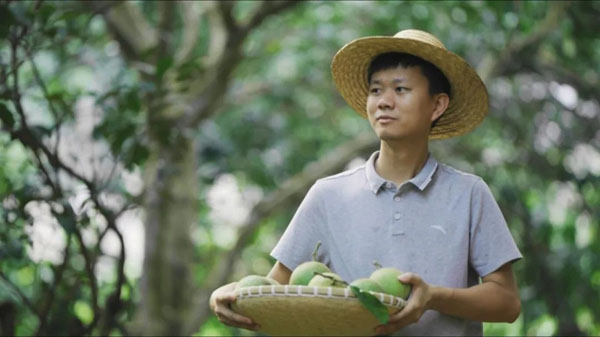Rural deputy strives to promote common prosperity
- (en.npc.gov.cn)
- Updated: 2024-10-29
Liao Zhilue, 31, a native of Huazhou in Maoming city, South China's Guangdong province, has an ambition to promote prosperity in his hometown through developing the agribusiness of Huajuhong, or pummelo peel, one of the most widely used Chinese herbs for respiratory diseases.

Liao Zhilue, a native of Huazhou in Maoming city, South China's Guangdong province, collects the pummelo fruit. [Photo provided to npc.gov.cn]
Graduating from vocational college in 2015, Liao made a decision to return to his hometown and engage in the cultivation of Huajuhong, peels collected from pummelo trees widely, grown in Huazhou.
For two years, he worked tirelessly in the fields, studying planting techniques. In 2017, he established a specialized agricultural cooperative, gradually leading thousands of villagers in revitalizing the long-declining Huajuhong industry.
Liao's road to success was not smooth.
He grew up working in the fields with his grandfather and learned the traditional techniques of herbal processing. Upon returning to his village, Liao encountered initial distrust from farmers. Supported by incentives from local government, he made efforts to purchase their produce, employing various strategies to expand market reach.
Through years of perseverance, by 2023, the cooperative had established deep partnerships with more than 1,000 local farmers, creating direct employment opportunities for over 3,000 people.
Driven by a vision to modernize traditional practices, Liao immersed himself in mastering grafting, tree management and processing techniques, and explored avenues for storage, processing and sales.
To increase sales, he utilized live streaming to broaden the reach of his products and propel the industry forward. Working with his colleagues, he posted more than 1,000 short videos introducing the culture of Huajuhong on multiple e-commerce platforms. Many of the videos received thousands, even tens of thousands, of likes, bringing in over one million orders.
As the short videos spread, the e-commerce business of Liao's cooperative began to flourish. He then came to the realization that promoting the culture of Huajuhong was more urgent and crucial than simply promoting his own brand.
"In the era of e-commerce, the popular Huajuhong should not be exclusive to my business alone. Only when the entire Huajuhong brand gains prominence can it drive the development of the entire industry in Huazhou," Liao said.
Thanks to his consistent efforts, Liao expanded the cooperative from an initial team of five to more than 300 individuals, and the industrial growth in turn catalyzed a remarkable transformation in his hometown.
In 2023, Liao was elected as a deputy to the National People's Congress (NPC). He said, "The people of my hometown have placed great hope in me. I will fulfill my duties and responsibilities, bring the voices of more rural communities to the NPC sessions, and contribute to rural vitalization."
Liao began promoting th concpet of treating Huajuhong as both a medicine and a food ingredient, not just a traditional remedy. Historical records indicate that Huajuhong can be used in tea, soups, and various dishes. In Guangdong, it has a long tradition of being used as both food and medicine, with no reported side effects.
Through extensive field research, expert consultations, and meticulous documentation of historical records related to Huajuhong's medicinal and culinary heritage, Liao consolidated grassroots voices to advocate for policy changes.
His persistent efforts bore fruit when the National Health Commission and the State Administration for Market Regulation included Huajuhong, along with other substances, in the dual-purpose food and medicinal material catalog in August this year. This decision, reflecting the aspirations of more than 350,000 industry practitioners, heralded a new era of growth in the Huajuhong industry.
With this regulatory breakthrough, Liao now sets his sights on securing national intangible cultural heritage status for Huajuhong processing techniques. His ambition is to leverage the cultural significance of the plant to enhance its international competitiveness, bringing them to the global stage.


